Trex vs Azek: Which Decking Material is Best for Your Outdoor Space?
If you’re planning to build a deck, two top brands often come up in the conversation: Trex and Azek. Both are high-quality choices for outdoor decks, but they have some key differences that could make one a better fit for your project.
Trex is a composite decking made from recycled materials, while Azek uses PVC, making it a bit different in terms of looks, feel, and durability. Here’s everything you need to know to make the right choice for your deck building project.
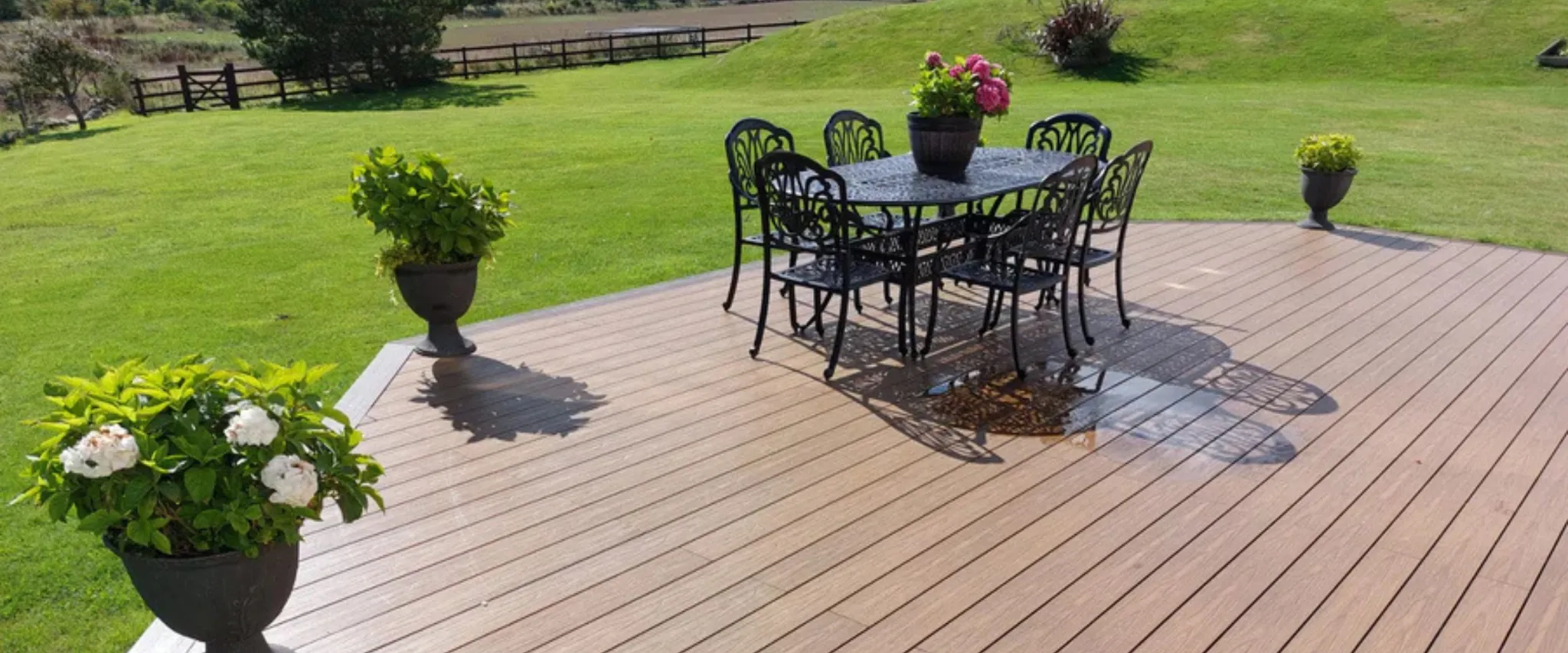
Key Takeaways
- Trex is made from 95% recycled wood and plastic, making it an eco-friendly composite decking option. Azek is made from premium PVC, which offers superior moisture resistance and heat reflection, ideal for wet or hot climates.
- Both options are low-maintenance and highly durable. Trex resists scratches, stains, and fading, while Azek excels in wet environments with its superior mold and mildew resistance.
- Trex offers a variety of colors and finishes, including wood-like textures, while Azek provides a lifelike wood appearance and additional flexibility with multi-width boards.
- Trex is more budget-friendly with diverse product lines and a strong focus on sustainability, while Azek, though pricier, offers premium durability and a cooler surface under sunlight.
Trex Decking: What to Know
- Pros of Trex Decking
- Eco-Friendly: Trex decking is made from 95% recycled materials, including reclaimed wood and recycled plastic, so it’s a greener choice.
- Low Maintenance: With Trex, you won’t need to worry about regular staining or sealing. Just occasional cleaning with soap and water keeps it looking good.
- Wide Range of Colors and Styles: Trex offers a variety of colors and finishes, from natural wood tones to more modern shades.
- Durability: Trex deck boards resist fading, staining, and scratching, making them great for families and pets.
- Cons of Trex Decking
- Heat Retention: In direct sun, Trex boards can get warm to the touch, which can be uncomfortable in hot climates.
- Cost: While Trex offers some affordable options, the higher-end lines can be pricey.
Best For: Trex is ideal if you’re looking for a durable, eco-friendly, and stylish deck that requires minimal maintenance.
Azek Decking: What to Know
- Pros of Azek Decking
- Extremely Durable: Azek is highly resistant to moisture, mold, and mildew, making it a great choice for rainy or humid climates.
- Lightweight: PVC decking is lighter than composite materials, which can make installation a bit easier.
- Heat Resistance: Azek boards tend to stay cooler than composite decking, which is great for hot climates.
- Lifelike Wood Look: Azek is known for its beautiful finishes, which look like high-end natural wood without the upkeep.
- Cons of Azek Decking:
- Pricey: Azek’s premium look and durability come at a cost, often making it more expensive than Trex.
- Less Eco-Friendly: Unlike Trex, Azek isn’t made from recycled materials, which may be a factor for those wanting a greener option.
Best For: Azek is great if you live in a wet or hot climate and want a deck that mimics wood without absorbing moisture.
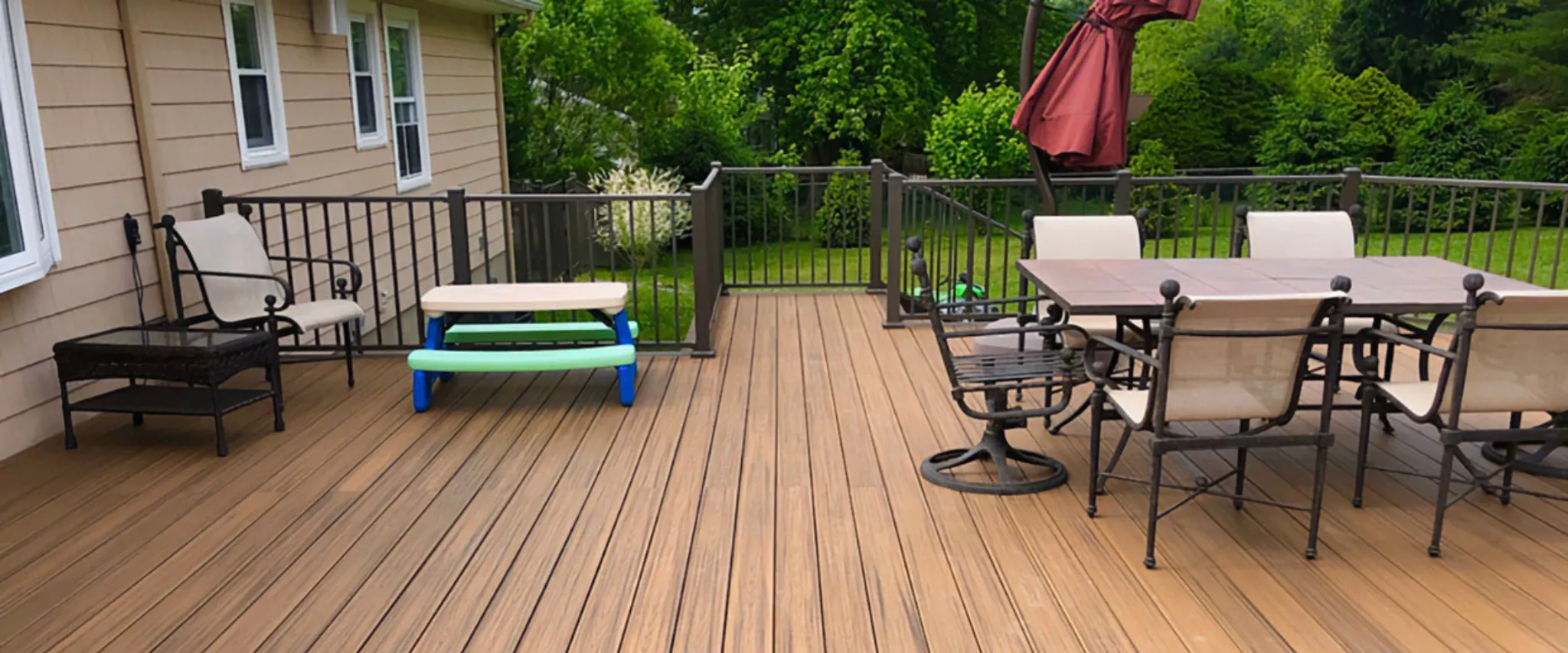
Comparing Durability and Maintenance
When it comes to durability and maintenance, both Trex and Azek hold up very well, but their strengths shine in different areas.
Trex: Trex decking is resistant to scratches, stains, and fading, making it a long-lasting option. Because it’s made of composite decking materials, Trex boards are generally resistant to rot and mold but may not perform as well as Azek in very damp environments. Maintenance is minimal – a simple wash every so often keeps Trex looking fresh.
Azek: Azek’s PVC decking takes durability up a notch. It’s highly resistant to water damage, mold, and mildew, and is excellent for areas with lots of rain or humidity. PVC decking materials like Azek are incredibly low maintenance, requiring just a quick cleaning with mild soap and water.
Design and Aesthetic Options
Your deck’s look is a big part of why you’re investing in new decking materials, and both Trex and Azek offer great options.
Trex: Trex offers a range of colors, from warm natural wood tones to more modern grays and deep hues. They also offer various textures, so you can pick a finish that resembles wood grain or something sleeker.
Azek: Azek has its own range of beautiful colors and textures. It’s known for its realistic wood look, and some Azek lines can mimic premium wood species with impressive detail. Azek also offers multi-width deck boards, giving you more design flexibility.
Environmental Impact
If eco-friendliness is a priority, Trex has a clear advantage here, as it’s made from recycled plastic and wood fibers.
Trex: Trex is made from 95% recycled materials, so it’s an excellent choice if you want to minimize environmental impact. Using reclaimed wood and recycled plastic, Trex keeps tons of waste out of landfills each year.
Azek: Azek’s PVC composition doesn’t include recycled plastic, so it’s not as environmentally friendly as Trex. However, TimberTech (Azek’s parent company) has committed to sustainable practices, including recycling efforts within their manufacturing processes.
Cost Comparison
Price is often one of the deciding factors in any deck project, and here’s how Trex and Azek compare:
Trex: Trex offers several product lines at different price points, from the affordable Trex Enhance line to the higher-end Trex Transcend. This variety means you can find something that fits your budget without compromising on quality.
Azek: Azek generally sits at a higher price point than Trex, reflecting its premium PVC material and impressive durability. While the initial cost may be more, Azek’s long-lasting nature and low maintenance may make it worth it for some homeowners.
Which Is Best for You?
Ultimately, the choice between Trex and Azek comes down to what matters most to you and your deck’s environment.
- If you’re in a humid, rainy, or coastal area, Azek might be the best fit thanks to its moisture resistance.
- If eco-friendliness and budget are more important, Trex is the better choice with its recycled content and affordability.
- For those who want a cool-to-the-touch surface in a hot climate, Azek has the edge with its heat-resistant properties.
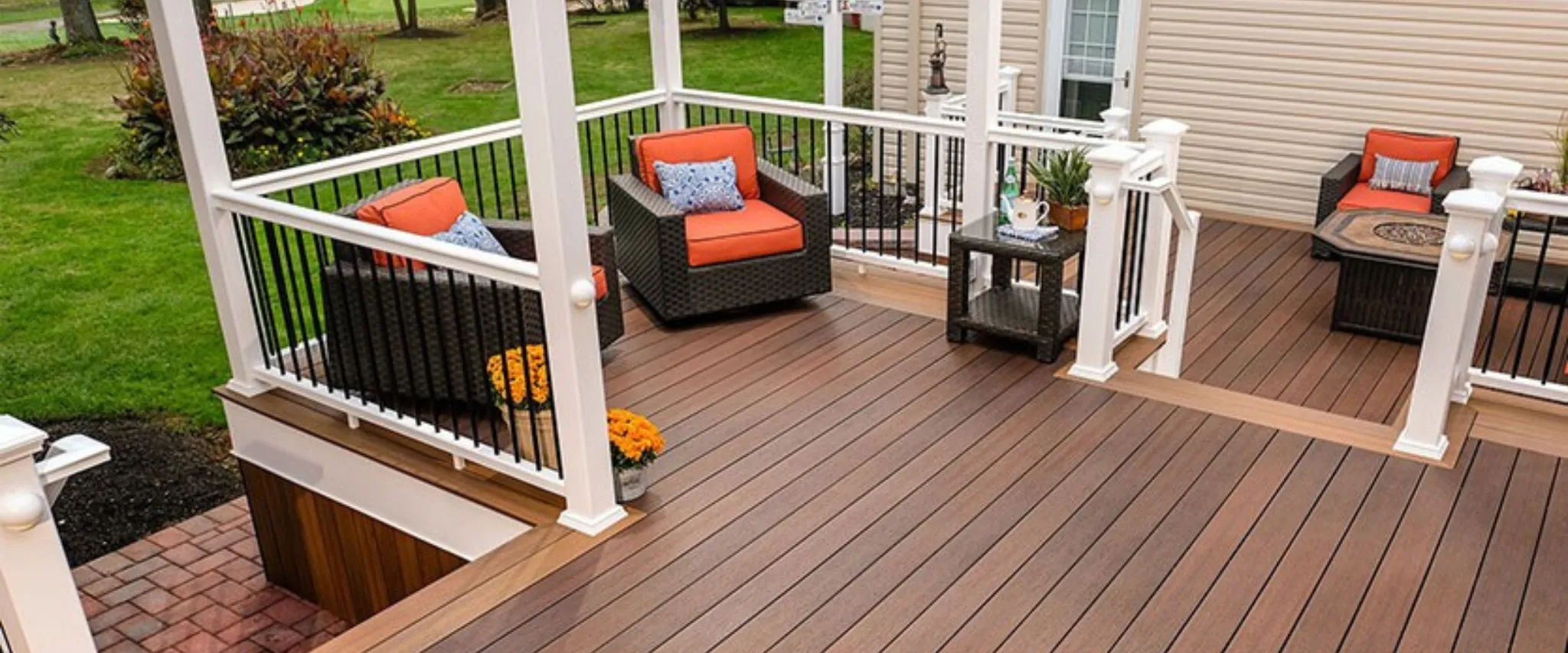
FAQs
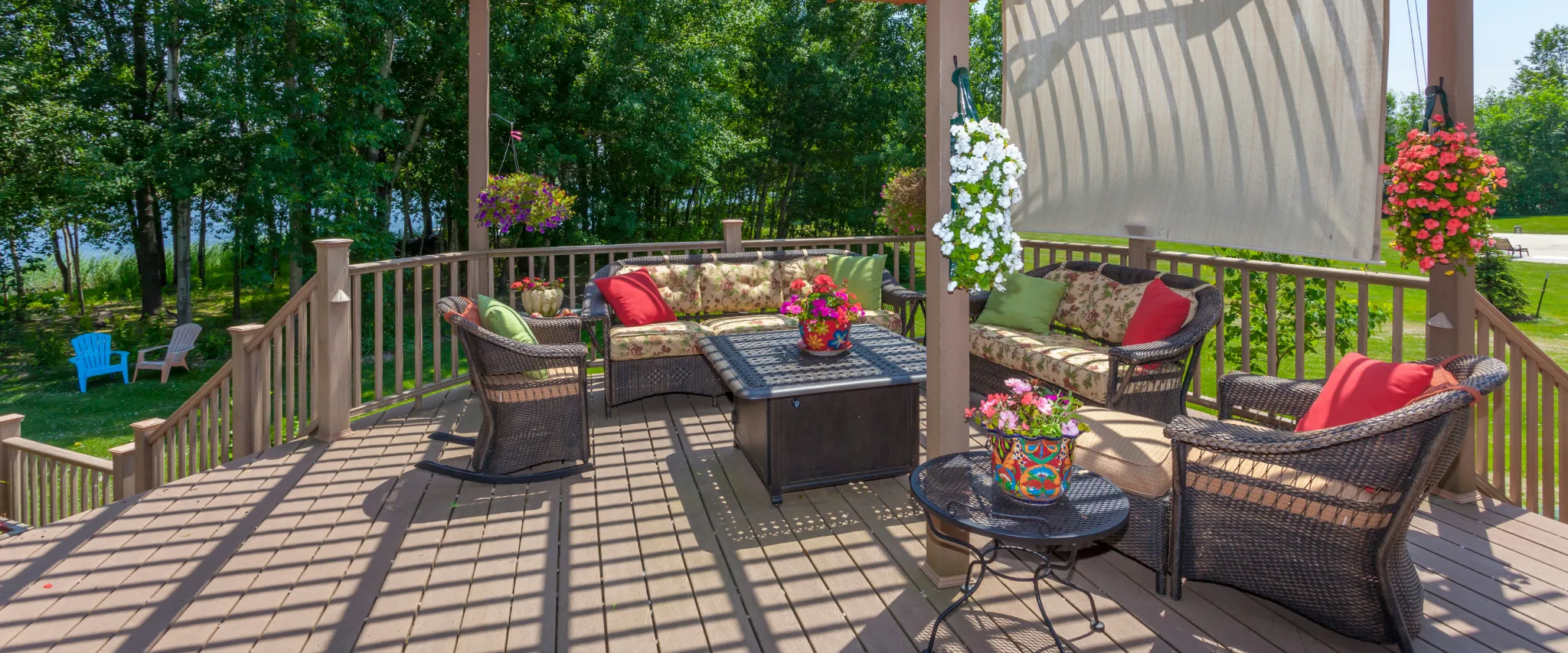
Wrap-Up with Riverview Decks
Choosing between Trex and Azek can feel like a big decision, but remember that both are excellent choices for a durable, low-maintenance deck. Whether you prefer Trex’s eco-friendly composite decking or Azek’s premium PVC with cooler surfaces, both offer fantastic options to transform your outdoor space.
Ready to get started on your decking project? Riverview Decks is here to help you find the perfect match and make your deck building project a reality. Contact us today at (865) 801-4545, and let’s build a deck you’ll love for years to come!
